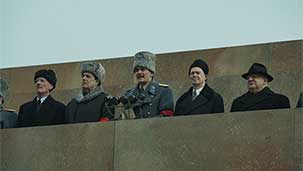The buck stops with you, doesn’t it, Dear Leader? Sure, you share writing credits with five others and the film has enough producers to fill a small dacha, but it is you who wields the iron fist. And as the creative, you fearlessly lead your army of fellow filmmakers to the Promised Land, making one of the funniest, absurdly dark and frighteningly relevant political satires I’ve ever had the pleasure of viewing.
I am not just heaping praise on you out of fear of being sent to a gulag. The Death of Stalin is seriously funny, and hilariously serious. It’s a balance few filmmakers can strike so expertly, and one you have spent a career honing. From Veep, to The Thick of It, and In the Loop, your mastery of modern political satire is unmatched.
Adapted from a French graphic novel, The Death of Stalin revolves around the power struggle that ensues following the illness and subsequent death of one of the world’s most merciless dictators. Stalin transformed Russia from a peasant state to world superpower through brutal tactics that left many of his country-people dead, or imprisoned, and left the rest terrified of his totalitarian rule. Not many filmmakers would have the capacity to portray one of the bleakest periods of modern history with such hysterical results, but you surrounded yourself with a brilliant cast who brought the absurdity of this situation into stark relief.
The farcical plot which finds members of Stalin’s hubristic inner circle stabbing each other in the back while gleefully keeping up the pretext of business as usual only serves to underscore the inevitability of absolute power corrupting absolutely. Seeing Stalin hold court at a bacchanalian dinner with his committee heads, who chest bump, drink, and threaten each other is reminiscent of any mob gathering portrayed in The Sopranos. You immediately show the audience that these men are terrified thugs, devoid of any moral compass that doesn’t advance their own egomaniacal agendas. Following this scene, you show us these same men going home to relay the night’s events – who said what about whom, what made Stalin laugh – to their wives to transcribe them into notebooks. These men are as pathetic as they are horrible, and watching their panicked and desperate power-grabs play out is the textbook definition of mining comedy from tragedy.
Having some basic knowledge of the actual events and the players involved is helpful but not necessary to the enjoyment of The Death of Stalin. You took many liberties, namely having your actors speak in their natural accents rather than having them try to affect the same parodic Russian patois, which was the first of many brilliant choices you made. It was far more comically effective hearing Steve Buscemi’s Kruschev and Jeffery Tambor’s Malenkov trade barbs in their native tongue instead of fumbling for historical accuracy. The lines are delivered so lightning fast that it was difficult enough to keep up with them while doubled over in laughter. Having the actors struggle to keep up some pretext that their sycophantic motivations were rooted in anything other than the sheer ridiculousness of the narrative would have been an unnecessary conceit and detracted from the film’s tone.
In some ways, knowing less about this period in history might be an advantage. Much of what actually occurred is so over-the top - Stalin being treated by unknown doctors because he’d had his medical team shot or sent to the gulag, Stalin’s son Vasily hiding from his father the fact that he is responsible for accidentally killing the entire national hockey team – that they could have been invented. The events with which you took dramatic license – the hysterical game of telephone played around Stalin’s corpse, a pianist being accused of “unauthorized narcissism”, the ruched curtain debacle, and the pervasive use of anachronistic cursing – only amplify the film’s comedic impact. Picking apart this film’s historical inaccuracies is missing the point. You show us that these horrible men were capable of absolutely anything that would serve their agendas. These men are pitiful, not pitiable, and in the case of characters like Beria and Kruschev, you never let us forget that these men are pure evil.
Any audiences who have been paying attention to recent events, particularly in America, will see obvious parallels between Stalin’s slavering ministers and the deplorable and inept toadies surrounding the current President. Your talent for exposing the sheer insanity of self-serving political machinations is a much needed salve for those of us who wake up every day, check Twitter, and want to cry. Laughter is always better.
Spasibo,
Di







